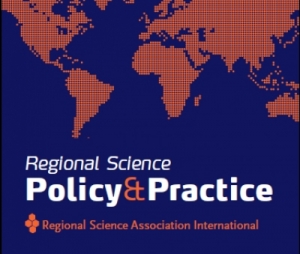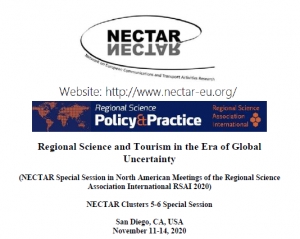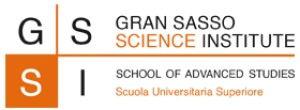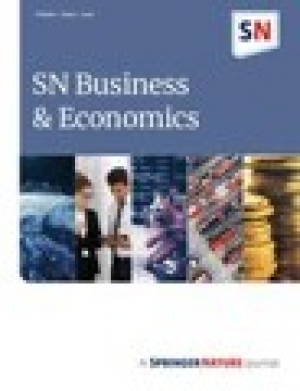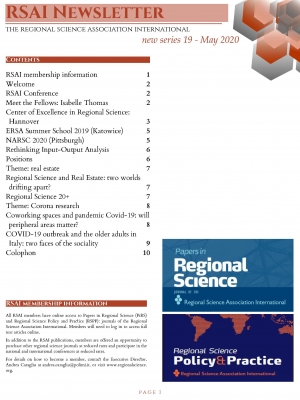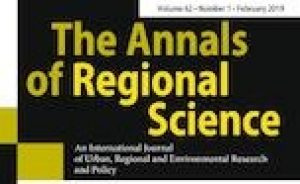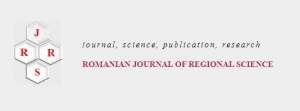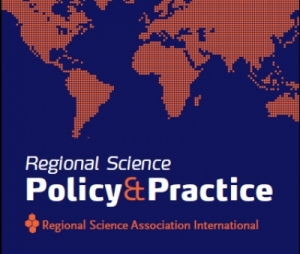Council
Elisabete Martins
Call for papers for RSPP Special Issue on Spatial Aspects of Migration, Borders and Integration
Call for papers for RSPP Special Issue on
Spatial Aspects of Migration, Borders and Integration
Globalization and urbanization interrelates with migration, borders and integration. Issues managed by far away and suffered in proximity that deserve regional science scrutiny able to inform sensible policies.
The aim of this special issue is to look into migrant flows, barriers and integration and their impacts on sustainable development of source, passage and destiny regions.
The special issues associates with a Workshop in Tijuana and a Special Session in NARSC Congress.
Topics include but are not limited to, the following:
- Regional economic growth
- International and cross-border trade
- Environmental issues of border
- Cross-border Governance, cooperation and administration
- Migration, third country safe, asylum and refugees
Scholarly articles focus on policy issues in Latin America are especially encourage, but any work with related topics are welcome.
Papers can present the results of research, discuss conceptual approaches to policy implications, describe work in progress or raise issues for debate.
Interested scholars are encouraged to submit an article in the platform of Regional Science Policy and Practice (https://rsaiconnect.onlinelibrary.wiley.com/journal/17577802) until September 11, 2020. The papers will be on-line after accepted by a blind peer review process.
Coordinator of this Special Issue:
Rafael Garduño-Rivera This email address is being protected from spambots. You need JavaScript enabled to view it.
Call for papers | Special Issue RSPP on Regional Science and Tourism in the Era of Global Uncertainty
Regional Science and Tourism in the Era of Global Uncertainty
(NECTAR Special Session in North American Meetings of the Regional Science Association International RSAI 2020)
NECTAR Clusters 5-6 Special Session
San Diego, CA, USA
November 11-14, 2020
Call for papers
As part of the Annual Meetings of 2020 North American Regional Science Council (NARSC) in San Diego, CA from November 11 to 14, 2020, we would like to invite you to special session(s) for “Tourism and Regional Science in the Era of Global Uncertainty” that Nectar clusters 5 and 6 are organizing jointly with the NARSC and RSAI.
The website for submission is now open in the User Area of NARSC website (https://www.narsc.org/newsite/userarea/UserArea.php). Short abstracts as well as full papers (also in draft format) will be accepted for the Special Session.
If you are interested in presenting your research in this special session, please submit an abstract (2,000 to 5,500 characters and spaces) through the conference portal. Information on how to do that can be found here. Upon submitting your abstract, you will receive an abstract ID number (e.g. P12345). Please send your abstract ID number and a copy of your abstract to Jaewon Lim, University of Nevada Las Vegas (This email address is being protected from spambots. You need JavaScript enabled to view it.), Juan Carlos Martin, University of Las Palmas de Gran Canaria (This email address is being protected from spambots. You need JavaScript enabled to view it.) and Luca Zamparini, University of Salento (This email address is being protected from spambots. You need JavaScript enabled to view it.) no later than June 30, 2020.
Selected full papers will be invited for publication in a special issue of the Regional Science Policy & Practice Journal, following standard review/revision procedures.
(https://rsaiconnect.onlinelibrary.wiley.com/journal/17577802).
Main topic
Christaller (1964) was probably one of the first regional scientists who analysed, after the conference held in Lund during 1963, the patterns on geographical location of tourist activity. Christaller found that “It is typical for places of tourism to be on the periphery. In this way, regions economically benefit from factors which cannot be utilized otherwise: high mountain chains, barren, rocky landscapes, heather, unproductive dunes.” (p.86). Since then, the tourism industry has changed dramatically. It is not so much the activity to move away from each other but instead to be with each other visiting their places and new places, also being involved with tourists in our own places because the we, and the places we live, are nice. That is why regional science – the study of human interaction within space with sound methods – has a say that can change the scientific perspectives on tourism that often miss space and the relation with each other. Regional Science as a discipline needs to analyse multiple strategies, policies and trends that are critical for tourist destinations that aspire to position and to consolidate their image in the world-wide network of tourist destinations at different geographical levels, urban or rural, within a framework of tough global competition. However, as world is currently experiencing, the unexpected events including but not limited to pandemic contagious diseases, regional political instabilities, safety issues with terrorist attacks, make the future of tourism uncertain. Due to the increasing concerns for mobility across space with the growing global uncertainty, tourism activities are expected to get downward pressure, while the increasing demand for various types of experience in tourism destinations may boost the worldwide growth of tourism in the future.
For this reason, potential topics discussed at the Special Session include:
- How can tourism studies benefit from Regional Science?
- Quantitative methods of Regional Science applied to Tourism
- Pandemic Diseases and Tourism Industry
- Consumer Behavior & Tourism Analysis
- From Well-Being and Happiness of tourists to Quality of Life of host residents.
- New Directions and Paradigms in Regional Science applied to Tourism
- From Decision Making to Travel Behavior
- Regional Science and Hospitality Research. The notion of industrial clusters.
- Tourism Infrastructure. Natural and Cultural Endowments
- Tourism Flows. Place, Time and Activities
- National and Regional Tourism and Travel Competitiveness
- Tourism Trends. Climate Change and Sustainable Tourism
- Tourism Demand: Demographic, Behavioral and Social Changes.
The abstracts/papers will be reviewed by the Organizing Committee and the notification of paper acceptance will be distributed by July 15th, 2020.
Organizing committee. For more information or questions please contact Jaewon Lim, University of Nevada Las Vegas (This email address is being protected from spambots. You need JavaScript enabled to view it.), Tomaz Dentinho, University of the Azores (This email address is being protected from spambots. You need JavaScript enabled to view it.); Juan Carlos Martin, University of Las Palmas de Gran Canaria (This email address is being protected from spambots. You need JavaScript enabled to view it.) and Luca Zamparini, University of Salento, (This email address is being protected from spambots. You need JavaScript enabled to view it.).
NECTAR is a European-based scientific association. The primary objective is to foster research collaboration and exchange of information between experts in the field of transport, communication and mobility from all European countries and the rest of the world. It is a multidisciplinary social science network. It brings together a wide variety of perspectives on transport and communication problems and their impacts on society in an international perspective. For further information see: http://www.nectar-eu.eu
Call for Papers – New Discussion Paper Series in Regional Science and Economic Geography – Gran Sasso Science Institute, L’Aquila, Italy
The Gran Sasso Science Institute in L’Aquila, Italy has launched a new Discussion Paper Series in Regional Science and Economic Geography.
With an article that relates the spatiality of COVID-19 to the structure of local economies, the GSSI area of Social Sciences launches a Discussion Paper series in Regional Science & Economic Geography (RSEG), which aims at providing a forum for debating initial research outcomes of high quality standard.
It hosts contributions on a wide range of topics within and across regional science and economic geography, encouraging a variety of theoretical and methodological perspectives on socio-economic phenomena with an inherently spatial nature. Each article undergoes a light and fast review process managed by a Scientific Committee within the GSSI area of Social Sciences (for this and other info about how to submit a contribution, visit the website).
The Discussion Papers address some of the most urgent issues and trends of the 21st century, like socio-spatial (income/wealth) inequalities, migration flows and labour mobility, disasters (natural, environmental and health) and resilience, globalisation vs. localisation patterns, the political economy of urban and regional development, the geography of innovation and entrepreneurship, tech-driven urban and regional economies (e.g. platform urbanism), the shifting location of economic activity and new technologies, just to mention a few.
The series is inaugurated by the paper “The geography of COVID-19 and the structure of local economies: The case of Italy”, in which Andrea Ascani, Alessandra Faggian and Sandro Montresor (GSSI Social Sciences) develop an analysis of the relationship between the geography of COVID-19 and the structure of local economies, by focusing on the case of Italian provinces. In order to explain the striking spatial unevenness of COVID-19, the paper hypothesises and offers preliminary evidence that locations specialised in economic activities that are characterised by high geographical concentration might be subject to relatively higher infections due to the agglomeration advantages characterising these industries.
More details and submission guidelines can be found here
Call for Papers - International Borders: Economic and Business Development Perspectives – Special Issue of SN Business & Economics
Editors: Rafael Garduño-Rivera (School of Business & Economics, Universidad Panamericana, Mexico); Haoying Wang (Department of Business and Technology Management, New Mexico Tech, USA)
Today, every region across the globe experiences different issues among its international borders. For example, the US-Mexico border region (quite different to the US-Canada and the Mexico-Guatemala borders), the Kashmir region in Asia, the UK and its relationship with the EU (and Ireland), the North-South Koreas, Greece and Cyprus, Colombia and Venezuela, and the list goes on. International borders exist to protect domestic markets while facilitating cross-border trade and communications. From an economic perspective, both sides along the border would benefit from opportunities associated with an open border. The reality often finds a situation being complicated by various socio-economic factors from policies to social norms.
Regional conflicts along international borders have become a major externality of the globalization process. In the meantime, economic and business development opportunities exist along international borders. How to resolve the conflicts and transition to binational coordination and development has been an interesting topic to academics, NGOs focusing on international development, and the concerned public.
This collection expects to attract studies from different parts of the world to learn about the economic and business development conditions along different international borders and how each country is dealing with or taking advantage of them. The collection will enrich our knowledge of the policy landscape and the private enterprise in each of the unique situation. New insights can be drawn to provide inputs to forge policies facilitating cross-border development.
While we are in the era of globalization, a lot of economic and business development opportunities are left unexplored along international borders. This collection will raise awareness of these problems and explore the reasons behind the status quo. An open and in-depth discussion can help to identify the influential factors and support policymaking to tap into the economic and business development potential along international borders. This collection seeks disciplinary perspectives from regional economics, international trade, entrepreneurship, environmental and natural resources economics, and public policy. It is also open to interdisciplinary studies.
Research is welcomed across the following areas, and others:
- The economics of migration
- Cross-border trade
- Port economy and agglomeration along international borders
- Environmental and natural resources management along international borders
- Border-region economic development
- The economic impact of cross-border illegal activities
- Border tourism and day trips
- Poverty and inequality in border regions
- Spatial economic analysis related to border effects
We are explicitly excluding studies (1) concerning border wars and political conflicts; (2) movements of peoples across international borders; (3) cross-border international aid. While these topics are definitely of policy importance and research interest, they usually fall out of the realm of economic and business development.
The collection accepts theoretical, empirical, and policy studies in the form of original research paper and review paper. In-depth case studies may be considered. The author(s) are encouraged to communicate with the guest editors before submitting a case study. All manuscripts should follow the journal’s submission guidelines.
This is a rolling collection and submissions will be accepted until the end of May 2021. Authors who wish to discuss ideas for articles are encouraged to contact the guest editors directly before submission. Full papers must be submitted via the journal’s submission system. Submissions by email will not be considered.
The website for the special issue can be found here.
RSAI newsletter May 2020
Dear RSAI members,
It is a pleasure to reach out to all of you in these difficult months. As you may know by now, RSAI decided to postpone the 2020 World Congress, which would have taken place on Marrakech on June 2/5, 2020. This and other news, as well as many interesting articles on Real Estate and on the spatial implications of the COVID-19 emergency, are featured in the new issue of the RSAI Newsletter (https://www.regionalscience.org/images/PDF/Newsletter%202020%20May.pdf), skillfully edited by Martijn Smit and Graham Clarke.
The Newsletter, and the many initiatives described in it as well as on our website (https://www.regionalscience.org/), testify that RSAI maintains a strong link with our larger community. While waiting to meet each other in person hopefully soon, I hope you enjoy reading this news.
Kind regards,
Andrea Caragliu
Executive Director, Regional Science Association International
The Annals of Regional Science, Vol. 64, Issue 3 - New Issue Alert
|
Call for Papers | Special issue of the Romanian Journal of Regional Science (Postponed deadlines)
Call for Papers - Postponed deadlines
Romanian Journal of Regional Science (rjrs.ase.ro) invites contributions for the special issue entitled ”Uncovering territorial inequalities and spatial justice in the EU”, under the auspices of the Horizon 2020 project IMAJINE – Integrative Mechanisms for Addressing Spatial Justice and Territorial Inequalities in Europe, with Ana Vinuela, University of Oviedo, Spain and Maria Plotnikova, Aberystwyth University, UK as Guest Editors.
The special issue is planned to be launched by mid-December, 2020. Submission deadline: October 11 at This email address is being protected from spambots. You need JavaScript enabled to view it.
The problem of territorial inequality is especially important for the EU. The European project has been a long-running process of the coming together of the European states into a single territorial unit. Territorial inequalities have long persisted in the EU. Following a period of convergence in the 1990s and early 2000s, the 2008 financial crisis had widened regional economic disparities in Europe. Territorial inequalities have been targets of policy intervention via regional policy and more recently, Cohesion policy with the objective to promote more balanced and more sustainable territorial development.
Policy intervention is deemed necessary because territorial inequalities in economic performance may over-time lead to divergence in levels and trajectories of development among regions, preventing lagging regions from reaching their potential and necessitating fiscal transfers from richer ones. Territorial inequalities engender migration flows from poorer to richer regions contributing to cumulative causation behind the persistence of inequalities. Territorial inequalities in unemployment and health bring about clusters of multi-dimensional deprivation, increasing reliance on welfare disbursements and public provision of services. Moreover perception of territorial inequalities in ‘lagging’ or ‘left-behind’ regions may foster what has been termed as the “geography of discontent” expressed in grass-roots movements, support for extreme political parties and anti-establishment voting behaviour (e.g. Brexit vote outcome in the UK).
The perspective of spatial justice offers a new angle for analysing and ultimately tackling territorial inequality. Inequalities may be understood as differences in opportunities available for individuals expressed through access to (e.g. education, jobs, healthcare, services, and, ultimately social mobility) that differ across space and where spacial differences in access interact with its socio-economic determinants such as class, gender, age, ethnicity and others.
Understanding territorial inequalities therefore requires greater attention to regional and local socio-economic contexts. Doing so brings to light the interrelationship between economic inequality and other location-specific factors such as differential capacity of regions and localities to sustain economic activity, absorb economic shocks and respond to policy intervention, including Cohesion policies.
We invite papers addressing the issues of territorial inequalities and conceptualization of spatial justice from any disciplinary area.
Portuguese Review of Regional Studies (RPER): Nº 55 (2020) is already available!
It is a pleasure to inform you that the issue nº. 55 (2020) of our journal (Portuguese Review of Regional Studies) is now available online. You can accede to it using the link:
RSPP Call for Paper | Special Issue on Spatial Resilience and the Border Regions of Europe (NEW DEADLINE)
RSPP Call for Paper
Special Issue on Spatial Resilience and the Border Regions of Europe
One of the least exploited research directions in regional science is the investigation of spatial patterns in relation to resilience, as well as of the role that geographical positioning, respectively the interaction between space and socio-economic activities, play in fostering and enhancing resilience, especially in border regions.
Some key research questions arise as being particularly important for development policies: Are there spatial differences in the resilience outcomes, and have various regions different responses to economic shocks along with their ability to adapt to new economic circumstances, depending on the geographical positioning of a region? Are regions with external borders less resilient to economic, environmental, social or political shocks than regions without any national borders, or with borders that are internal to the EU? Is the impact of a shock on border regions different from the impact on domestic regions? Or does the impact differ on peripheral regions vs. central ones? Can cross-border cooperation reduce border effects and transform borders from a disadvantage into an opportunity? What role do physical, administrative, economic, cultural, institutional, or political barriers have on the resilience of border regions?
This special issue on Spatial Resilience and the Border Regions of Europe aims at responding to some of key challenges for border regions, collecting a set of studies on:
- The principles and effects of spatial resilience (be it cities, regions, rural areas, spatial labor markets, migration, transport systems, public facilities etc.);
- How to better connect and inter-connect the territorial dimension with the economic, social or the ecological issues of resilience in the borderline regions (both external and internal);
- The systemic vulnerability, territorial planning, growth patterns, urban development, quality of life and demographic aspects of cities in the border regions;
- The core-periphery structural differentiation or evolutionary paradigms connected with the resilience capacity;
- Border effects on resilience and the role of cross-border cooperation;
- New approaches on spatial dynamics, from the perspective of the equilibrating forces inherent in regional and urban systems.
Case studies on Romania, Bulgaria, Georgia, Armenia, Belarus, Azerbaijan, Ukraine, Poland, Hungary, Estonia, Leetonia, Latvia, Greece, Turkey, Russia and Finland, but also on the internal “borders” of EU will be more that welcomed.
Papers should be submitted to the regular review process of the journal (https://rsaiconnect.onlinelibrary.wiley.com/journal/17577802) until July 15, 2020.
The coordinators of the Special Issue:
Gabriela Carmen PASCARIU (This email address is being protected from spambots. You need JavaScript enabled to view it.)
Karima KOURTIT (This email address is being protected from spambots. You need JavaScript enabled to view it.)
Ramona TIGANASU (This email address is being protected from spambots. You need JavaScript enabled to view it.)
Invitation Special Issue in Economia Journal on "Applications and Methods for Spatial Economic Data"
Special Issues
Applications and Methods for Spatial Economic Data
Over the last decades, the georeferenced socio-economic datasets to individual level). Also, recent advances and developments in computer programming, geographic information systems and spatial econometric softwares provide the tools for handling this complex information. Spatial data add important contextual and locational information given the opportunity to estimate externalities, social interactions, spatial dependence and spatial heterogeneity in regression models. Techniques to analyze spatial Geography, Urban and Regional Planning and Development, Real Estate Studies, among others. This Special Issue aims to gather papers that include techniques in Spatial Statistics and Spatial Science. Topics include, but are not limited to: spatial regression model, exploratory spatial data analysis, spatial panel data models, regressions, spatial nonparametric methods, computational techniques in large spatial data sets. Both theoretical and empirical studies are welcome. All submitted articles will undergo rigorous peer review, and in the event of acceptance, are ensured rapid publication and high visibility.
Guest Editor:
Dr. Marcos Herrera. CONICET-IELDE, National University of Salta, Argentina. E-mail: This email address is being protected from spambots. You need JavaScript enabled to view it.
Deadline for manuscript submissions:
15 August 2020
Suggested links:
To make a submission, please follow this link and select the corresponding Issue.
To download this announcement PDF version, please click here.
About Us
The Regional Science Association International (RSAI), founded in 1954, is an international community of scholars interested in the regional impacts of national or global processes of economic and social change.

